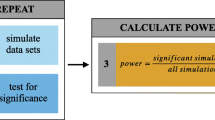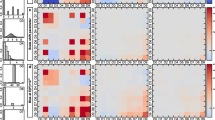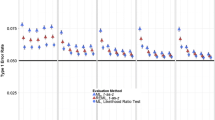Abstract
Sequential methods have been used for many applications; especially, when fixed sample procedures are not possible and/or when “early stopping” of sampling is beneficial for applications. At the same time, the issue of how to make correct inferences when measurement errors are present has drawn considerable attention from statisticians. In this paper, the problems of sequential estimation of generalized linear models when there are measurement errors in both adaptive and fixed design cases are studied. The proposed sequential procedure is proved to be asymptotically consistent and efficient in the sense of Chow and Robbins [Ann Math Stat 36(2):457–462, 1965] when measurement errors decay gradually as the number of sequentially selected design points increases. This assumption is useful in sequentially designed experiments, and can also be fulfilled in the case when replicate measurements are available. Some numerical studies based on a Rasch model and a logistic regression model are conducted to evaluate the performance of the proposed procedure.
Similar content being viewed by others
References
Albert A (1966) Fixed size confidence ellipsoids for linear regression parameters. Ann Math Stat 37: 1602–1630
Amemiya Y (1985) Instrutmental variable estimator for the nonlinear errors in variables model. J Econom 28: 273–289
Anscombe FJ (1952) Large sample theory of sequential estimation. Proc Cambridge Philos Soc 48: 600–607
Ashenfelter O, Krueger A (1994) Estimates of the economic returns to schooling from a new sample of twins. Am Econ Rev 84: 1157–1173
Berkson J (1950) Are there two regressions? J Am Stat Assoc 45: 164–180
Billingsley P (1986) Probability and measure. Wiley, New York
Carroll RJ, Ruppert D, Stefanski LA, Crainiceanu C (2006) Measurement error in nonlinear models: a modern perspective, 2nd edn. Monographs on Statistics and Applied Probability, vol 105. Chapman and Hall/CRC Press, New York
Chang Y-cI (1999) Strong consistency of maximum quasi-likelihood estimate in generalized linear models via a last time. Stat Probab Lett 45: 237–246
Chang Y-cI (2001) Sequential confidence regions of generalized linear models with adaptive designs. J Stat Plan Inference 93: 277–293
Chen K, Hu I, Ying Z (1999) Strong consistency of maximum quasi-likelihood estimators in generalized linear models with fixed and adaptive designs. Ann Statist 27(4): 1155–1163
Cheng C-L, Van Ness JW (1999) Statistical regression with measurement error. Oxford University Press, Oxford
Chow YS, Robbins H (1965) On the asymptotic theory of fixed-width sequential confidence intervals for the mean. Ann Math Stat 36(2): 457–462
Chow YS, Teicher H (1988) Probability theory, 2nd edn. Springer, New York
Dantzig GB (1940) On the non-existence of tests of “student’s” hypothesis having power functions independent of m. Ann Math Stat 11(2): 186–192
Dvoretzky A (1972) Asymptotic normality for sums of dependent random variables. In: Proceedings of Sixth Berkeley Symposium Math Statist. Probability, vol 2. University of California Press, Los Angeles, pp 513–535
Firth D (1993) Bias reduction of maximum likelihood estimates. Biometrika 80: 27–38
Fischer GH, Molenaar IW (1995) Rasch models: foundations, recent developments, and applications. Springer, Heidelberg
Ford I, Titterington DM, Kitsos CP (1989) Recent advances in nonlinear experimental design. Technometrics 31: 49–60
Freedman L, Fainberg V, Kipnis V, Midthune D, Carroll R (2004) A new method for dealing with measurement error in explanatory variables of regression models. Biometrics 60(1): 172–181
Ghosh BK, Sen PK (1991) Handbook of sequential analysis. Marcel Dekker, Inc, New York
Ghosh M, Mukhopadhyay N, Sen P (1997) Sequential estimation. Wiley, New York
Hsiao C (1992) The econometrics of panel data, chapter nonlinear latent variables models. Kluwer, Dordrecht
Jones DH, Jin Z (1994) Optimal sequential designs for on-line item estimation. Psychometrika 59: 57–75
Kong FH, Gu M (1999) Consistent estimation in cox proportional hazards model with covariate measurement errors. Stat Sin 9: 953–969
Lai TL, Robbins H, Wei CZ (1979) Strong consistency of least-square estimate in multiple-regression ii. J Multivar Anal 9: 343–361
Lai TL, Wei CZ (1982) Least squares estimates in stochastic regression models with applications to indentification and control of dynamic systems. Ann Statist 10: 154–166
Li T (2002) Robust and consistent estimation of nonlinear errors-in-variables models. J Econom 110(1): 1–26
Li T, Hsiao C (2004) Robust estimation of generalized linear models with measurement errors. J Econom 118(1–2): 51–65
Liang KY, Liu X (1991) Estimating equations in generalized linear models with measurement error. In: Godambe VP (eds) Estimating functions. Oxford University Press, Oxford, pp 47–63
Lord MF (1971) Tailored testing, an application of stochastic approximation. J Am Statist Assoc 66: 707–711
McCullagh P, Nelder JA (1989) Generalized linear models, 2nd edn. Chapman & Hall, London
Mukhopadhyay N, Datta S, Chattopadhyay S (2004) Applied sequential methodologies: real-world examples with data analysis. Marcel Dekker, New York
Ortega JM, WC Rheinboldt (1970) Iterative solution of nonlinear equations in several variables. Academia Press, San Diago
Siegmund D (1985) Sequential analysis: tests and confidence interval. Springer, New York
Stefanski LA, Carroll RJ (1985) Covariate measurement error in logistic regression. Ann Statist 13(4): 1335–1351
Stein C (1945) A two sample test for a linear hypothesis whose power is independent of the variance. Ann Math Statist 16: 243–252
Wainer H (2000) Computerized adaptive testing: a primer, 2nd edn. Lawrence Erlbaum, Hillsdale
Woodroofe M (1982) Nonlinear renewal theory in sequential analysis. SIAM, Philadelphia
Wu CFJ (1985) Efficient sequential designs with binary data. J Am Stat Assoc 80: 974–984
Author information
Authors and Affiliations
Corresponding author
Rights and permissions
About this article
Cite this article
Chang, Yc.I. Sequential estimation in generalized linear models when covariates are subject to errors. Metrika 73, 93–120 (2011). https://doi.org/10.1007/s00184-009-0267-y
Received:
Published:
Issue Date:
DOI: https://doi.org/10.1007/s00184-009-0267-y




